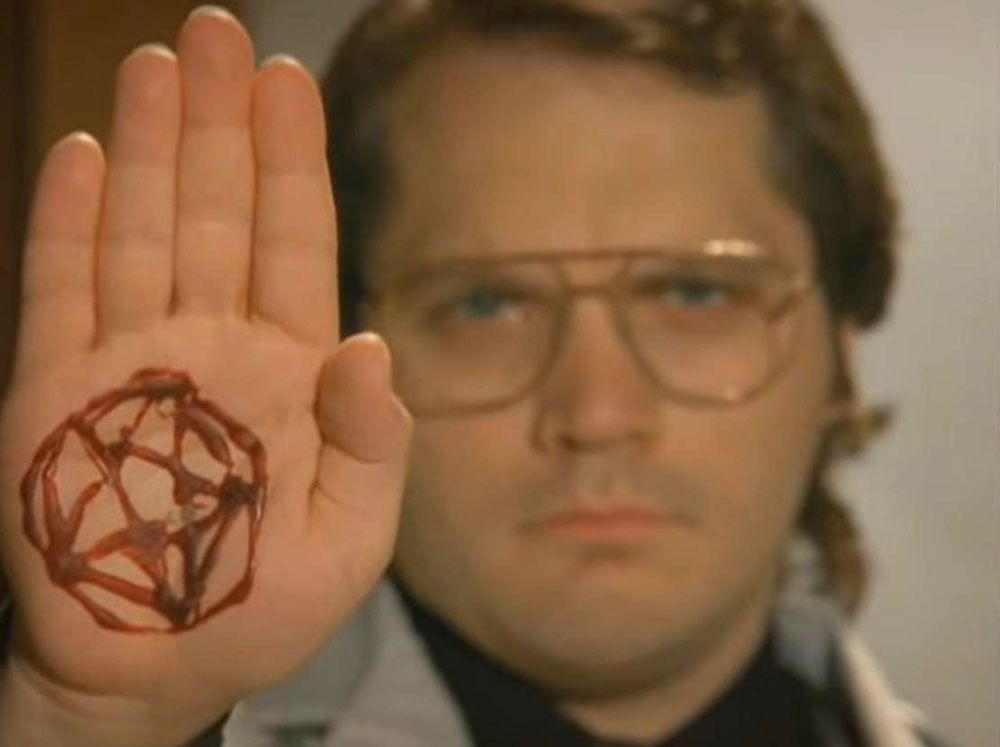The turn of the millennium put certain British comedians in a retrospective mood. From the late ’90s through the middle of the ‘00s, there was a flowering of series that parodied familiar television formats. Series like 1997’s Brass Eye (mocking TV news magazines), 1999’s People Like Us (human interest reportage), and 2002’s Look Around You (educational programs) burned briefly but brightly, each accruing cult followings that endure to this day—the fad’s apex perhaps being the legendary 2001 Brass Eye special “Paedogeddon.” As part of its Halloween programming, Metrograph is presenting a marathon run of one of this niche genre’s best offerings: Channel 4’s Garth Marenghi’s Darkplace (2004).
Darkplace is a pastiche of the kind of low-rent sci-fi and horror programming produced for UK television in the 1980s, but it also has a metafictional conceit that lets it build a deep internal mythology across just six episodes. Garth Marenghi (co-creator Richard Holness) is a pompous paperback penner—“I'm one of the few people you'll meet who've written more books than I've read”—and wannabe Stephen King who couldn’t even match Dean Koontz’s success. In the ‘80s he produced, wrote, and starred in Darkplace alongside his publisher, Dean Lerner (co-creator and series director Richard Ayoade), only for the series to be “suppressed” (it only aired in Peru). Each episode features contemporary interviews with Marenghi, Lerner, and co-star Todd Rivers (Matt Berry).
There are thus two plots. There’s the show-within-a-show about the supernatural happenings at “Darkplace Hospital,” such as telekinetically levitating houseware menacing staff or an enveloping mist with sinister Scottish ghosts. Then there’s the picture that emerges behind the scenes, as Marenghi discusses how he used the show to vent frustrations in his personal life. He bluntly introduces the episode “Skipper the Eyechild,” in which his character becomes irrationally protective of a baby eyeball creature, by saying it was his way of expressing his desire for a son. And this isn’t even the episode with his extremely memed declaration, “I know writers who use subtext, and they’re all cowards!”
Darkplace’s granular devotion to the finer details of its subject is admirable. It takes extreme effort to make something in the dicey range of “so bad it’s good” on purpose. Most attempts are just irony-poisoned masturbatory exercises. Darkplace’s retrospective framing helps it strike this balance; Lerner admits his lack of acting experience while Ayoade gives a masterclass in purposefully bad acting. The show uses Madeleine Wool (future horror director Alice Lowe) as a clichéd token woman who exists for the men to condescend to (“I guess being told I couldn't get a chicken supper was the straw that broke this camel's back. It was unprofessional and girlish; it won't happen again”), and one of the increasingly funny gags is her visible exasperation and dwindling patience with the role.
Some of the best moments are borne from the unique surrealism that characterized a great deal of low-budget British TV from this era. There are few more perfect joke sequences than Marenghi entering a room only for the patient within to immediately explode (with multiple repeats of the shot driving home the homage to John Cassavetes’s fate in 1978’s The Fury), Marenghi casually asking the disembodied head “Are you alrigh’?” and the head holding a conversation with him for another whole minute.
Garth Marenghi’s Darkplace screens this evening, October 27, at Metrograph.



